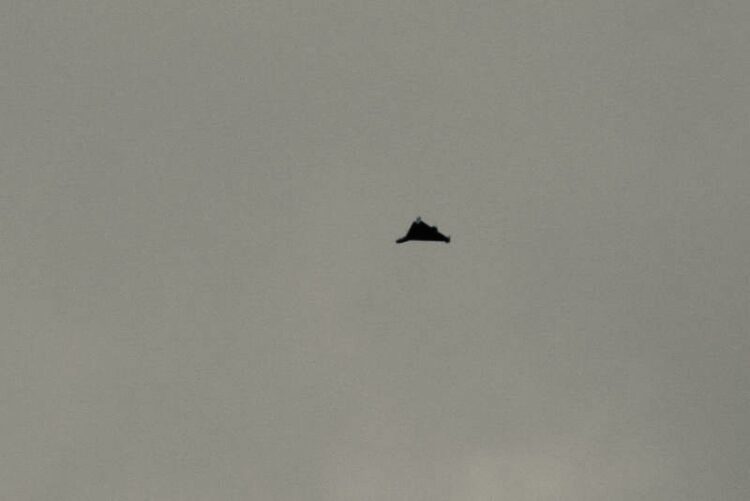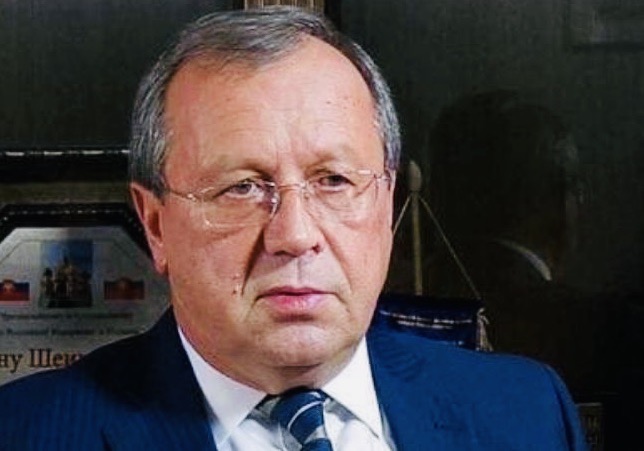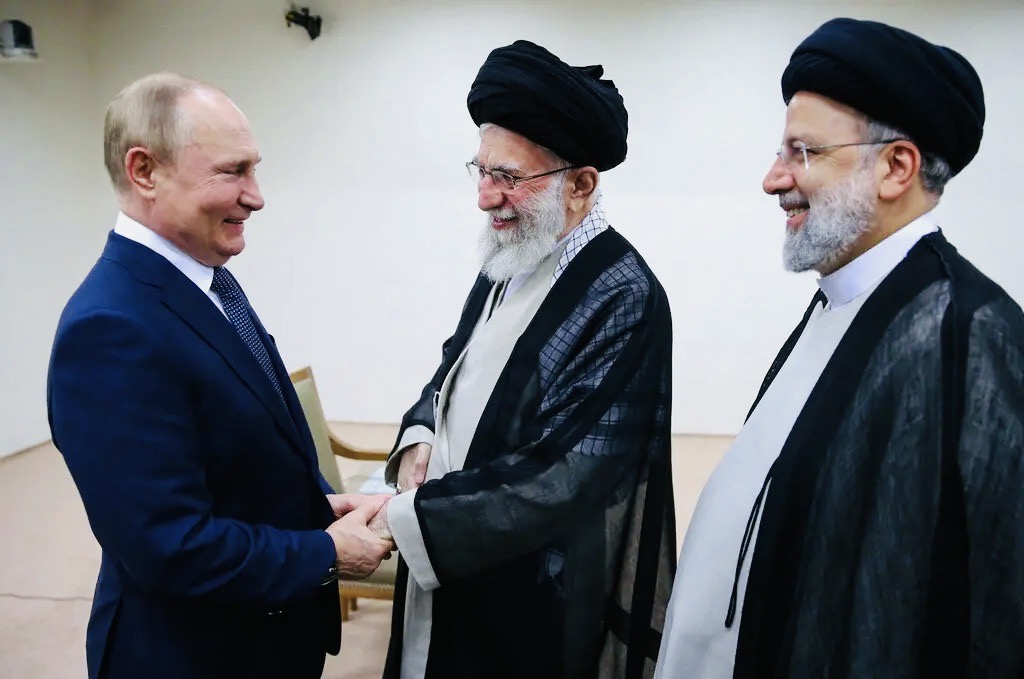Russia’s burgeoning alliance with Iran is an increasing source of concern to Israel, particularly after the appearance of Iranian kamikaze drones over Kyiv in support of Russia’s war effort in Ukraine.
The latest development confirms the supposition that Russia and Iran, both of which regard the United States as their foremost foe, have formed a transactional and potentially dangerous partnership.
Strictly speaking, this is not an entirely new alliance.
Russia and Iran have been working closely together in Syria — which has been embroiled in a civil war since 2011 — to protect President Bashir al-Assad’s embattled regime.
In 2015, Russia rushed aircraft and troops to Syria, its closest Arab ally, to save it from almost certain defeat at the hands of Syrian rebels. Russia committed itself to this course of action at the urging of Iran, one of Syria’s key allies.

Of late, Russia and Iran have joined forces in Ukraine, which was invaded by the Russians last February. Russia recently took delivery of Shahed-129 and Shahed-191 Iranian drones to bomb Ukrainian cities and Ukraine’s critical infrastructure in an attempt to terrorize and demoralize its population and sap its will to fight.
According to reports, Iran has sent instructors to Crimea — which was annexed by Russia from Ukraine in 2014 — to train Russians in the use of Iranian drones.
Speculation abounds that Iran will supply Russia not only with more drones but with short-range ballistic missiles in the near future.
Last week, Israeli Prime Minister Yair Lapid expressed “deep concern” about the newest wrinkle in Russia’s military relationship with Iran, blasting it as “absolutely unacceptable.”
As he put it in an interview with a Russian television network, “We naturally think that relations between Russia and Iran are a serious problem, not only for Israel but also for Ukraine, Europe and the whole world. Iran is a dangerous terrorist state, and the fact that Russia conducts business with Iran puts the whole world in danger.”
Nonetheless, Lapid said that Israel will continue to abide by its policy of neutrality between Russia and Ukraine, which Ukrainian President Volodymyr Zelensky has repeatedly criticized. In addition, Lapid said he will refrain from providing direct military assistance to Ukraine, despite its insistent request for Israeli air defence systems like the Iron Dome.
In justifying his policy, Lapid cited Israel’s military Syrian coordination agreement with Russia, which permits the Israeli Air Force to strike Iranian bases in Syria and bomb Hezbollah arms convoys heading into Lebanon without Russian interference.
Israeli Defence Minister Benny Gantz delivered an almost identical message to Ukrainian Defence Minister Oleksii Reznikov.

“Israel supports and stands with Ukraine, NATO and the West,” he said. “That being said, I would like to emphasize that Israel will not deliver weapon systems to Ukraine, due to a variety of operational considerations.”
Gantz, however, said that Israel would be open to supplying Ukraine with early warning systems to detect incoming drones and missiles.
In the meantime, as Zelensky has noted, Israel and Ukraine have been sharing information about Iranian drones.
Reznikov stated the obvious when he said that Iran’s assistance to Russia is to Israel’s disadvantage because it enables Iran to improve the capabilities of its drones. “The Iranians are gaining operational experience in the fighting in Ukraine,” he noted. In the future, he added, Iran may well turn its drones against Israel.
There is no doubt that Iran will learn lessons from the ongoing conflict in Ukraine to advance its drone technology.
The Russian government, though its ambassador in Tel Aviv, Anatoly Viktorov, has advised the Israeli government that Russia’s budding alliance with Iran poses no threat to Israel.
Characterizing Russia’s relations with Israel as “friendly,” he said, “Russia is not playing against Israel, and I would like to confirm that we fully and totally are taking into account the legitimate security concerns of Israel.”

But he warned that a sharp Israeli tilt toward Ukraine could change Russia’s attitude: “Any serious moves which will not take into account the national interest of our country (would) destroy this spirit of relations between our countries.”
Despite Viktorov’s soothing words, Israel has good reason to assume that Russia’s growing alliance with Iran will not be in its best strategic interest. As Vedant Patel, the deputy spokesman of the U.S. State Department, said recently, “It should be seen as a profound threat and something to which any country should pay very close attention.”
Russia’s partnership with Iran, a cardinal principle of which is to challenge Western interests in Europe and the Middle East, is sweeping in substance. As the Institute for the Study of War points out, Russia has upgraded its economic and military relations with Iran since last winter.
Iranian trade centers have been established in Moscow. Iranian flights to Russia have increased. Iran has joined the Russian MIR electronic payment system, which competes with the Western SWIFT financial transaction service, from which Russian banks were ejected in response to the invasion.
This past July, in one of his first trips abroad since the coronavirus pandemic, President Vladimir Putin flew to Tehran to consolidate Russia’s ties with Iran.
Iran, possibly, is conducting cyberattacks in aid of Russia, and Russia is likely giving Iran sophisticated military platforms in exchange for drones. Two months ago, Russia launched a Kanopus-V satellite on behalf of Iran to collect high-resolution imagery for its external military operations.
Russia, too, may provide Iran with state-of-the-art fighter jets such as the SU-35, thereby enabling Iran to field a modern air force.
Russia may well be cooperating with Iran to replace Russian soldiers with Iranian-backed forces in Syria. In recent months, Russia has redeployed Syrian-based troops and equipment to Ukraine.
Russia has reportedly withdrawn S-300 air defence missiles from Syria, thereby removing an impediment to Israeli airstrikes and reducing Russian leverage over Israel.
By the same token, the partial withdrawal of Russian troops from Syria may allow Iran to fill the resultant security vacuum. Several months ago, Iran’s supreme leader, Ayatollah Ali Khamenei, met Assad in Damascus to discuss the possibility of transferring Russian military positions in Syria to Iran and its proxies.
Subsequently, the commander of the Iranian Revolutionary Guards, Hossein Salami, visited Syria to oversee these transfers.
The war in Ukraine has definitely heightened Russia’s bilateral relations with Iran, Israel’s deadliest enemy. What effect it ultimately will have on Israel and the region is yet to be fully determined.
In the meantime, Israel is keeping a watchful and wary eye on Russia’s evolving alliance with Iran.
